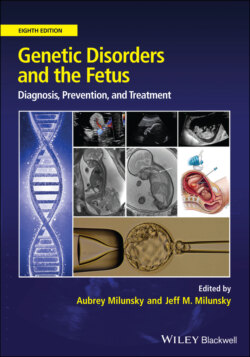Читать книгу Genetic Disorders and the Fetus - Группа авторов - Страница 61
Decision making
ОглавлениеThe presence of both parents for the consultation concerning possible elective abortion for a fetal anomaly is critical in this situation. All the principles governing the delivery of genetic counseling and discussed earlier apply when parents need to decide whether or not to continue their pregnancy. A brief explanation of some of the key issues follows, culled from over 50 years of experience in this very subject.
Doubt and disbelief crowd the parental senses in the face of such overwhelming anxiety. Was there a sample mix up? How accurate is this diagnosis? How competent is the laboratory? Have they made errors in the past? How can we be certain that there has been no communication failure? Is there another couple with the same name? There are endless questions and endless doubts. Each and every one needs to be addressed carefully, slowly and deliberately, with painstaking care to provide the necessary assurance and reassurance. Needless to say, the clinical geneticist or counselor must have thoroughly checked all the logistics and potential pitfalls before initiating this consultation. Errors have indeed occurred in the past.184, 185
The central portion of the communication will focus on the nature of the defect and the physician or counselor providing the counseling should be fully informed about the disorder, its anticipated burden, the associated prognosis, life expectancy, and the possible need for lifetime care. A clear understanding of the potential for pain and suffering is necessary, and an exploration concerning the effect on both parents and their other children is second only to a discussion about the potential effects on the child who is born with the condition in question. Any uncertainties related to diagnosis, prognosis, pleiotropism, or heterogeneity should emerge promptly. Questions related to possible future pregnancies should be discussed, together with recurrence risks and options for prenatal diagnosis.
The question concerning a repeat prenatal study is invariable, at least if not stated then certainly in the mind of the parents. There are occasions when a repeat test might be appropriate, especially if there is a failure to reconcile cytogenetic or molecular results with expected high‐resolution ultrasound observations. Maternal cell contamination (see Chapters 9, 11, and 14), while extremely unlikely in almost all circumstances, requires exclusion in some others. Some prenatal diagnoses may not easily be interpretable and a phenotype may not be predictable with certainty. A de novo supernumerary chromosome fragment in the prenatal cytogenetic analysis (see Chapter 11) or a microdeletion or microduplication (see Chapter 13) are key examples. VOUS, especially in a gene known to harbor pathogenic mutations, is unnerving. Where a VOUS is uninterpretable, decision making reverts to the fetal anomaly seen or biochemical abnormality observed. The sensitive counselor should offer a second opinion to anxious parents facing an uncertain prenatal diagnosis. The “compleat physician” anticipates virtually all of the patient's questions, answers them before they are asked, and raises all the issues without waiting for either parent to vocalize them.
Occasionally, there are powerful disparate attitudes to abortion between the spouses as discussed earlier. Such differences would best be considered during the preconception period, rather than for the first time when faced with a serious fetal defect. Resolution of this conflict is not the province of the physician or counselor, nor should either become arbitrator in this highly charged and very personal dispute, in which religious belief and matters of conscience may collide. The physician's or counselor's duty is to ensure that all facts are known and understood and that the pros and cons of various possible scenarios are identified in an impartial manner. A return appointment within days should be arranged. Questions of paternity have also suddenly emerged in this crisis period and can then be settled, sometimes with painful certainty.
